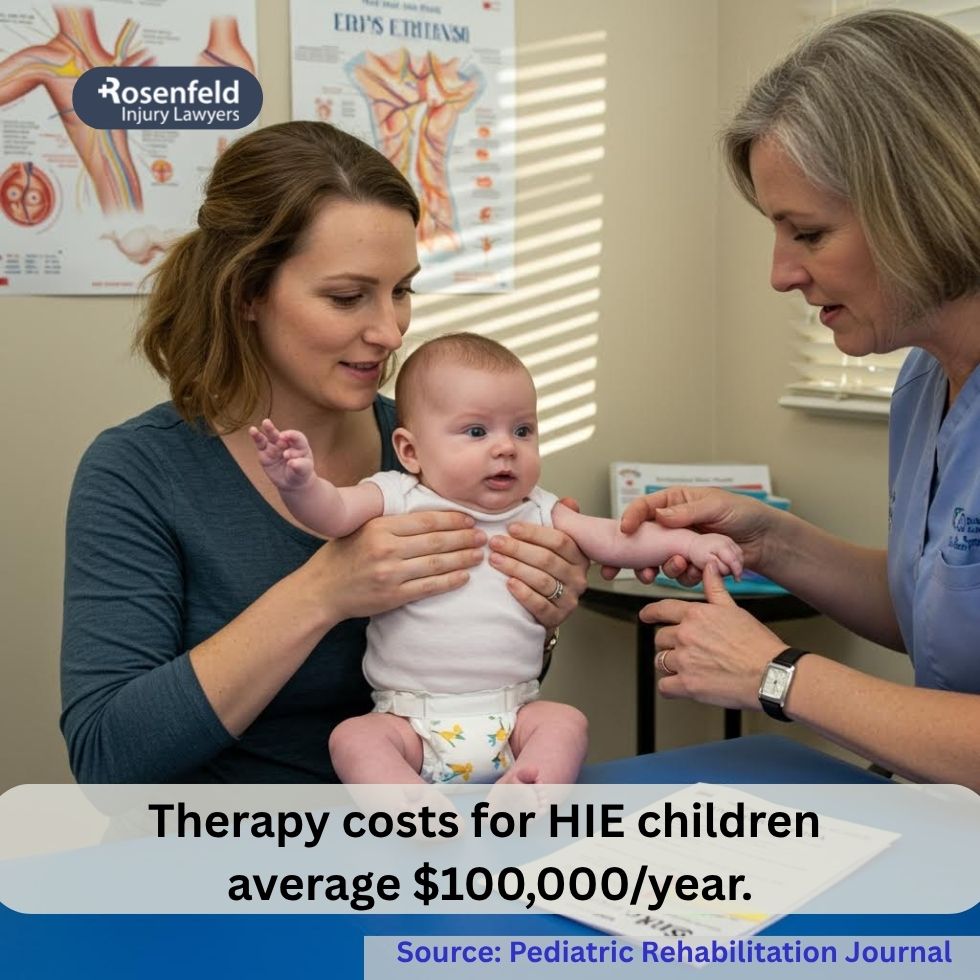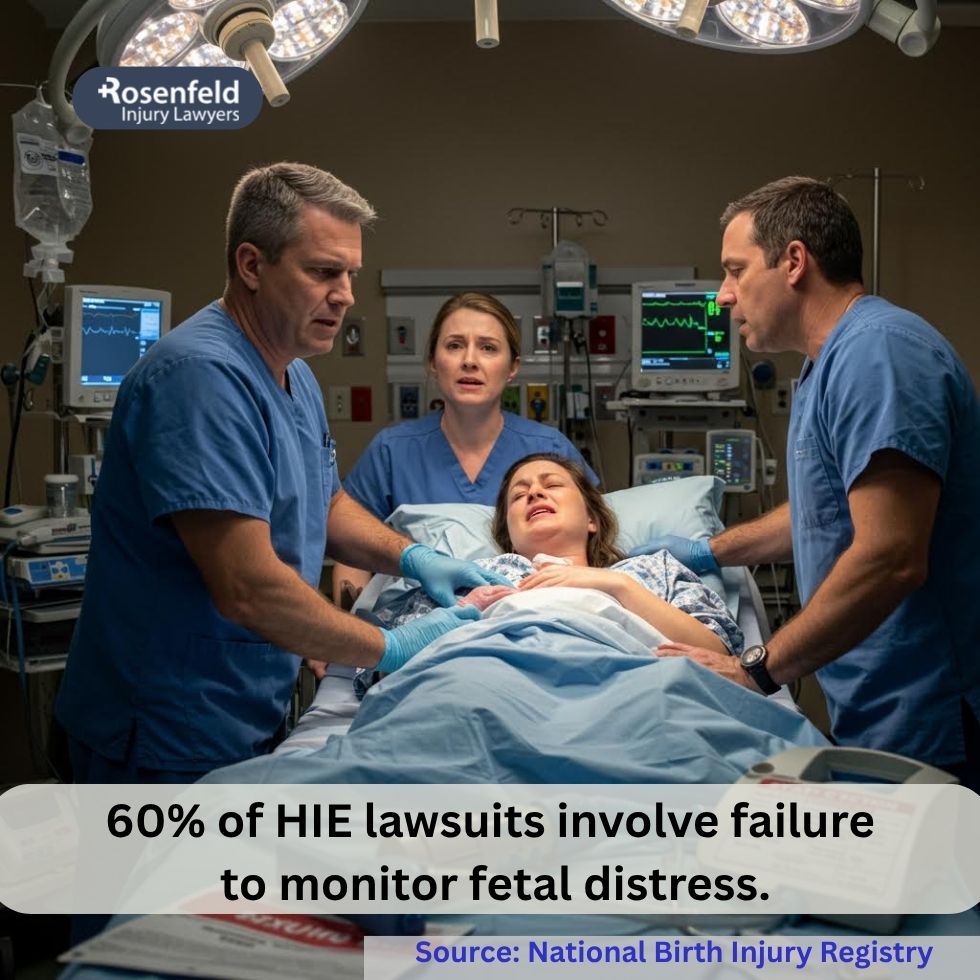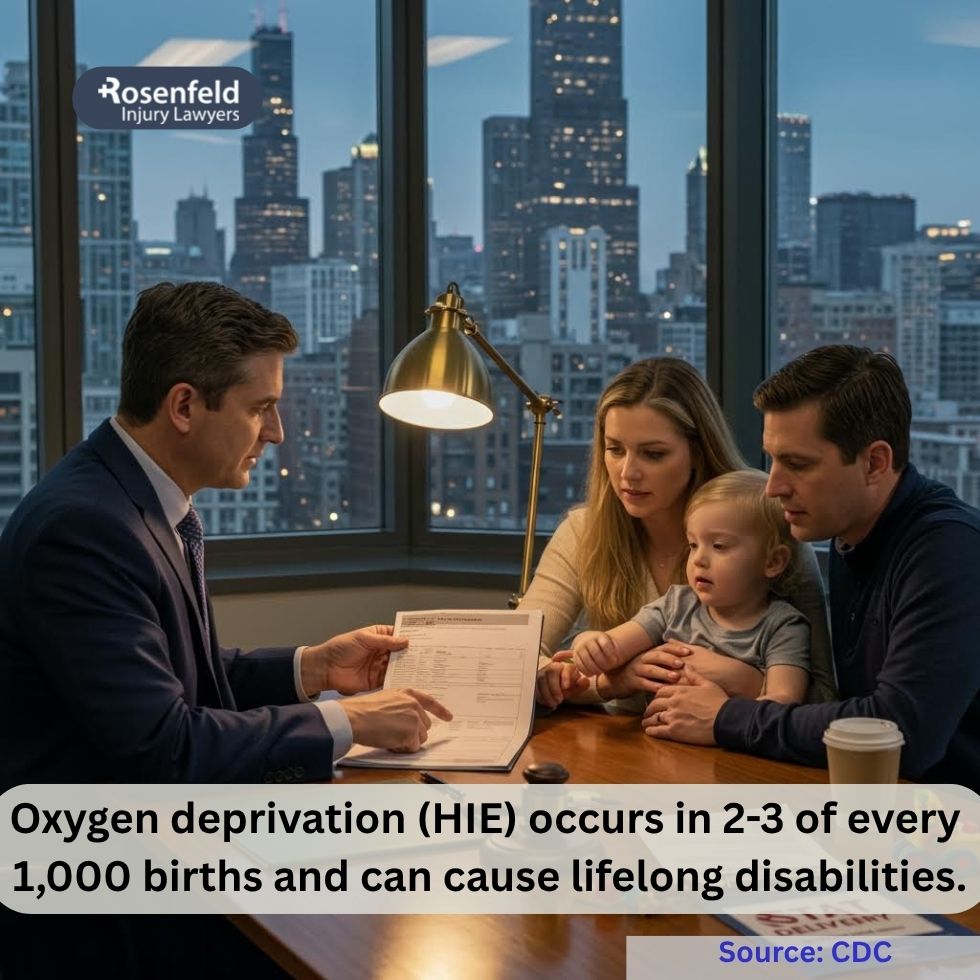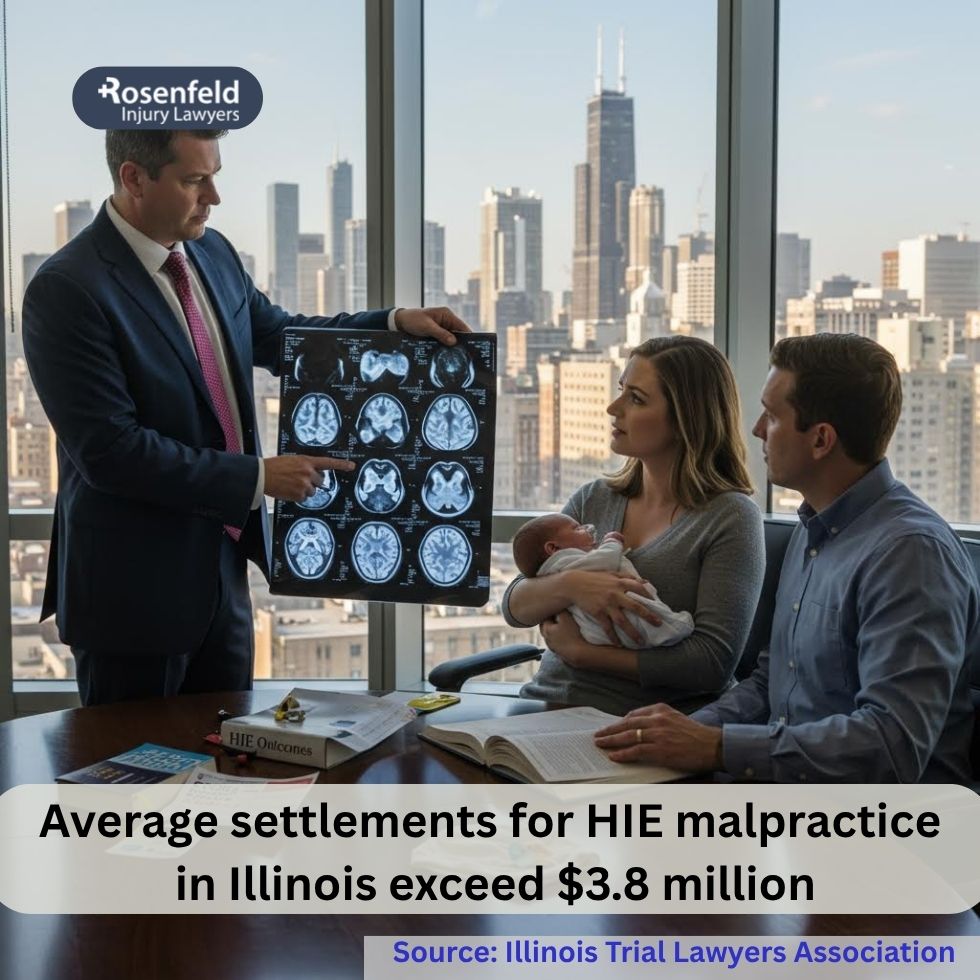- 24/7 Free Consultation: (888) 424-5757 Tap Here To Call Us
Chicago Oxygen Deprivation Birth Injury Lawyer

Seek Justice for Birth Injuries Caused by Oxygen Deprivation
If your child’s birth injury resulted from improper medical care, you may have grounds for a lawsuit. At Rosenfield Injury Lawyers, our Chicago oxygen deprivation birth injury lawyer team has handled numerous cases, helping families recover compensation for medical bills, ongoing care, and other financial burdens.
Oxygen deprivation during birth can cause serious injuries, leading to long-term health complications such as cerebral palsy, brain damage, and developmental delays. When medical professionals fail to monitor a baby’s oxygen levels or respond to signs of distress, the consequences can be life-altering.
Settlements & Verdicts Recovered by Our Chicago Law Firm
At Rosenfeld Injury Lawyers, our legal team has handled numerous Illinois birth injury cases, helping families hold medical providers accountable for preventable birth injuries caused during pregnancy, labor, and delivery.
- $11,250,000 Settlement – Julian was born at a Chicago hospital after medical staff failed to respond to signs of fetal distress during labor. He suffered oxygen deprivation, leading to cerebral palsy. His family pursued a birth injury lawsuit and secured $11.25 million to cover long-term medical care and therapy.
- $6,140,000 Settlement – Mila was diagnosed with ataxic cerebral palsy at age three after complications during delivery. Despite efforts by the defense to blame her condition on alleged parental behavior, her family obtained a $6.14 million settlement to support her future medical expenses and care needs.
- $5,000,000 Settlement – Ezra suffered a brachial plexus injury during a difficult delivery at a Cook County facility. He underwent multiple surgeries to restore function in his arm. His family’s claim resulted in a $5 million birth injury settlement, recognizing the lasting impact of the physical trauma and medical negligence.

What Causes Oxygen Deprivation During Labor and Delivery?
Oxygen deprivation birth injuries occur when a baby does not receive enough oxygen before, during, or immediately after birth. Several risk factors can contribute to oxygen deprivation during labor and delivery. Understanding these causes can help determine whether medical negligence played a role in your child’s injury and whether a birth injury lawsuit is warranted.
Umbilical Cord Complications
The umbilical cord is a baby’s lifeline, delivering oxygen and nutrients from the placenta. Any complication that restricts blood flow through the cord can cause hypoxia at birth, leading to injury or even wrongful death. Common issues that can cause oxygen deprivation include:
- Cord prolapse – When the umbilical cord slips through the birth canal before the baby.
- Cord compression – Pressure on the umbilical cord, often caused by improper fetal positioning or forceps and vacuum extractors.
- Knots or nuchal cord – A tight knot in the cord or a cord wrapped around the baby’s neck.
Placental Issues
The placenta provides oxygen and nutrients to the baby throughout pregnancy. If it fails to function correctly, the baby may suffer from oxygen deprivation before birth. Placental issues that can cause injuries include:
- Placental abruption – When the placenta separates from the uterus too early.
- Placental insufficiency – If the placenta does not develop properly or is damaged.
- Placenta previa – A low-lying placenta covering the cervix.
Maternal Health Conditions
A mother’s health during pregnancy plays a significant role in ensuring a safe birthing process. Certain maternal conditions can increase the risk of oxygen deprivation if they are not adequately managed. These include:
- High blood pressure or preeclampsia;
- Diabetes;
- Infections, such as chorioamnionitis;
- Excessive bleeding (hemorrhage).
Fetal Distress and Delayed Intervention
Fetal distress is a warning sign that a baby is not getting enough oxygen. Signs include an abnormal heart rate, decreased movement, and meconium-stained amniotic fluid. When these warning signs appear, doctors must act quickly to prevent brain damage and other birth injuries.
What Are the Signs and Symptoms of Oxygen Deprivation?
Oxygen deprivation at birth can cause severe injuries that may not be immediately apparent. Some newborns show evident distress right after delivery, while others may not exhibit symptoms until delays in development become noticeable.
A low APGAR score is one of the earliest indicators that a newborn may have experienced oxygen deprivation. The APGAR test is performed one minute and five minutes after birth to assess a baby’s health. It evaluates:
- Appearance (skin color)
- Pulse (heart rate)
- Grimace (reflex response)
- Activity (muscle tone)
- Respiration (breathing effort)
When a newborn does not receive enough oxygen, the body prioritizes sending oxygen-rich blood to the brain and heart, which can leave other organs deprived. This lack of oxygen can result in organ dysfunction, leading to lifelong complications or even fatal outcomes if not properly managed.
Newborn seizures within the first 24 to 48 hours after birth can indicate hypoxic brain injury. Seizures often suggest brain damage due to lack of oxygen, which may lead to neurological disorders.

What Are the Long-Term Effects of Birth Trauma Related to Oxygen Deprivation?
Oxygen deprivation at birth can cause permanent damage and lead to lifelong disabilities. The severity of these effects depends on how long the baby was without oxygen and how quickly medical professionals intervened.
Cerebral Palsy
One of the most common consequences of oxygen deprivation is cerebral palsy, a neurological disorder that affects muscle control, movement, and coordination. Depending on the severity, children with CP may have difficulty:
- Walking or maintaining balance;
- Controlling muscle tone (stiff or floppy muscles);
- Performing fine motor tasks (such as grasping objects);
- Speaking or swallowing due to impaired muscle function.
Many children with CP require lifelong therapy, assistive devices, and specialized medical care, adding significant financial strain on families.
Developmental Delays
Oxygen deprivation can slow a child’s ability to reach important milestones, such as:
- Sitting up;
- Crawling;
- Walking;
- Talking.
These delays may indicate injury and require early intervention therapies to improve the child’s long-term prognosis.
Cognitive Impairments and Learning Disabilities
A child who suffered brain injury may experience cognitive impairments, affecting:
- Memory and concentration;
- Problem-solving skills;
- Language and communication abilities;
- Reading and math comprehension.
These challenges may require special education services, individualized learning plans (IEPs), and speech or occupational therapy to help the child succeed academically.
Seizure Disorders and Epilepsy
Severe oxygen deprivation can cause damage to the brain, leading to seizure disorders or epilepsy. Some children experience frequent seizures, which can interfere with daily activities and learning. These conditions often require lifelong medication and medical monitoring.
Sensory and Motor Impairments
Children affected by birth trauma involving oxygen deprivation may develop:
- Hearing or vision impairments;
- Difficulty with coordination and balance;
- Fine motor skill difficulties (such as writing, buttoning clothes, or using utensils).
Many children need physical and occupational therapy to improve their motor skills and independence.
Behavioral and Emotional Challenges
In some cases, oxygen deprivation can lead to behavioral issues, such as:
- Hyperactivity or attention disorders (ADHD);
- Impulsivity or difficulty with emotional regulation;
- Anxiety or depression.
These challenges may require behavioral therapy, counseling, or medication to help the child manage emotions and social interactions.

Does Oxygen Deprivation During Childbirth Constitute Medical Malpractice?
When medical staff fail to prevent or respond to oxygen deprivation during birth, the consequences can be devastating. Birth injuries caused by a lack of oxygen often lead to cerebral palsy, permanent brain damage, and lifelong disabilities. Many of these injuries are preventable when doctors and nurses follow proper medical procedures.
Establishing Negligence in Oxygen Deprivation Cases
Medical negligence occurs when a doctor, nurse, or other medical provider fails to provide adequate medical care, leading to harm. In oxygen deprivation cases, this means that medical staff:
- Was unable to recognize and respond to distress;
- Did not properly monitor the baby’s oxygen levels;
- Delayed necessary medical interventions, such as a C-section;
- Misused delivery tools.
To prove negligence, a Chicago birth injury lawyer must demonstrate that the healthcare providers failed to meet the standard of care, directly causing the injury.
Common Examples of Medical Negligence
Negligent actions that can lead to oxygen deprivation include:
- Failing to monitor fetal heart rate properly;
- Ignoring signs of distress;
- Not performing necessary interventions, such as repositioning the mother or increasing oxygen flow;
- Failure to order an emergency C-section when the baby is in distress;
- Delays in performing the procedure leading to brain injury;
- Surgical mistakes during the procedure that further harm the baby or mother;
- Overuse of Pitocin, leading to dangerous contractions;
- Failure to stop or adjust medication when complications arise;
- Administering the wrong dosage or incorrect medication.
These errors can increase the risk of damage to the baby’s brain, creating grounds for a lawsuit.
The Importance of Expert Testimony
Proving negligence in birth injury cases requires strong medical evidence and expert analysis. Expert witnesses play a crucial role in:
- Reviewing medical records to identify errors or negligent actions;
- Explaining how proper medical care could have prevented the child’s injury;
- Establishing a direct link between medical negligence and oxygen deprivation.
These expert opinions are essential in building a strong birth injury case and securing compensation for families. A Chicago medical malpractice lawyer will work with expert witnesses to ensure healthcare providers are accountable for their mistakes.
What Damages Can Be Recovered Following Oxygen Deprivation During Childbirth?
Families affected by oxygen deprivation birth injuries may be entitled to compensation for various economic and non-economic damages, including:
- Past and future medical bills;
- Lost earning capacity;
- Pain and suffering;
- Cost of specialized care;
- Home and vehicle modifications;
- Loss of enjoyment of life.
A Chicago brain injury lawyer can calculate the full extent of damages and fight for the compensation your family deserves.
What Is the Average Oxygen Deprivation Birth Injury Claim in Chicago?
Based on Law.com’s VerdictSearch, the average award for an oxygen deprivation birth injury claim is approximately $36.87 million, with reported case values ranging from $1.75 million to over $100 million.
Several key factors influence case value:
- Severity of injury: Claims involving permanent brain damage often result in higher compensation due to the child’s long-term medical and care needs.
- Future medical expenses: Life care plans backed by medical experts may include decades of physical and occupational therapy, assistive equipment, and in-home nursing care.
- Strength of medical evidence: Clear medical records showing missed signs of fetal distress, improper fetal monitoring, or delays in performing a C-section strengthen a medical malpractice claim.
- Impact on the child’s future: If the child’s injury affects mobility, communication, or cognitive function, damages may include projected lost earning capacity and significant non-economic damages.
- Extent of medical negligence: Cases involving obvious medical errors or apparent deviations from the standard of care–such as ignoring umbilical cord complications or delaying intervention–often result in higher payouts.
- Wrongful death claims: In cases where the child suffered fatal injuries, settlements or verdicts may include compensation for emotional distress, pain and suffering, and funeral expenses.
Example Cases
$75.9 Million Verdict – Traumatic Delivery Causes Hypoxia and Brain Damage
Hannah Housen was born severely distressed after doctors at the University of Chicago Medical Center used excessive force during a twin delivery attempt. The infant suffered hypoxia, brain bleeding, and brachial plexus injuries after a resident improperly performed an internal podalic version under limited supervision.
Expert testimony linked the baby’s oxygen deprivation and brain trauma to the unnecessary and forceful procedure. Now living with mild cerebral palsy and long-term cognitive impairment, Hannah requires ongoing therapy and supervision. A Cook County jury awarded the family $75,859,000, reflecting extensive future treatment costs and lifelong care needs.
$53 Million Verdict – Delayed C-Section Causes Hypoxic Brain Injury in Newborn
Lisa Ewing presented to the University of Chicago Medical Center with signs of fetal distress, yet doctors delayed an emergency cesarean section for nearly twelve hours. Her son, Isaiah, was born with birth asphyxia and severe cerebral palsy due to prolonged oxygen deprivation.
The lawsuit argued that the hospital’s medical staff ignored non-reassuring fetal heart rate patterns and improperly induced labor rather than performing immediate surgery. The jury sided with the family, awarding $53 million for future medical care, lost earning capacity, and emotional distress, finding that timely intervention would have prevented Isaiah’s serious birth injury.
$23.6 Million Verdict – Delayed Delivery and Missed Treatment Cause Hypoxic-Ischemic Brain Damage
Amirah Whiten suffered hypoxic ischemic encephalopathy at Saint Joseph Hospital after doctors delayed emergency delivery despite clear signs of distress. Attorneys for her family argued that Amirah’s oxygen deprivation and brain damage resulted from both a delayed C-section and failure to perform available brain cooling therapy after birth.
The hospital denied negligence, claiming the injury occurred before arrival, but the jury found otherwise. Now living with severe cognitive impairment and ongoing physical challenges, Amirah was awarded $23,594,000 to cover future medical costs, lifelong care, and significant loss of normal life.
$13 Million Settlement – Delayed Emergency Delivery After Placental Abruption Leads to Severe Brain Injury
Veniscia Humphrey’s child, Teniscia, suffered brain injury and seizures after a delayed emergency C-section at South Suburban Hospital in Hazel Crest. Despite symptoms of placental abruption, the attending physician failed to detect a fetal heartbeat in time, delaying delivery.
Teniscia was born with profound neurological disabilities, requiring lifelong medical care and assistance with daily activities. The lawsuit, brought under the Federal Tort Claims Act, settled for $13 million, structured to fund the child’s future treatment expenses and long-term supervision needs.
What Laws Govern Birth Injury Lawsuits in Illinois?
735 ILCS 5/2‑622 requires that any medical malpractice lawsuit include a certificate of merit. This document, signed by a qualified medical professional, confirms that there is a reasonable basis for alleging medical negligence. Without it, a case can be dismissed. The rule ensures that claims, such as those involving oxygen deprivation or cerebral palsy, are supported by credible medical evidence before proceeding.
Under 735 ILCS 5/13-212, those who want to file a birth injury claim must do so within two years of discovering the injury, but no more than four years from when the negligent act occurred. For minors, the period is extended to eight years, though it cannot go beyond the child’s 22nd birthday.
In LeBron v. Gottlieb Memorial Hospital, the Illinois Supreme Court struck down caps on noneconomic damages in medical malpractice cases. The court ruled that limiting jury awards for pain and suffering or loss of normal life violated the state constitution. This ruling allows families affected by birth injuries to pursue full and fair compensation for long-term harm caused by medical negligence during labor and delivery.

Why Choose Our Chicago Birth Injury Lawyers
At Rosenfield Injury Lawyers, we understand the devastating impact that oxygen deprivation birth injuries can have on a child and their family. We have handled numerous cases, helping families recover compensation for medical costs, specialized care, and long-term needs. We are committed to holding medical providers accountable when their mistakes lead to preventable birth injuries.
Extensive Experience in Birth Injury Litigation
Our birth injury attorneys have a proven track record of success in handling birth trauma cases. Our law firm thoroughly investigates each case by analyzing medical records, consulting experts, and identifying negligent actions. We aggressively pursue legal claims to ensure families receive the compensation they need for ongoing medical care and quality of life.
Compassionate and Dedicated Legal Advocacy
We recognize that a child’s birth injury is a life-changing event for the entire family. Parents are often left feeling overwhelmed, struggling to manage medical bills, therapy appointments, and emotional distress. Our birth injury lawyers provide compassionate legal support, guiding families through the birth injury litigation process with care and dedication.
Access to Leading Medical Experts and Resources
Proving medical malpractice in oxygen deprivation cases requires strong medical evidence. Our birth injury attorneys work with top medical experts who specialize in:
- Neonatal care and distress monitoring;
- Neurology and brain injury assessment;
- Obstetrics and the labor and delivery process;
- Pediatric rehabilitation and long-term care planning.
These medical professionals help us establish how oxygen deprivation occurred, whether it could have been prevented, and how it has affected the injured child’s life. Their testimony strengthens our cases, ensuring healthcare providers are accountable for their mistakes.
How Do I Know if Medical Malpractice Caused My Child’s Oxygen Deprivation?
While some complications during childbirth are unavoidable, many cases of oxygen deprivation occur because medical staff fail to provide proper care.
Here are key signs that medical malpractice may have occurred:
- Failure to monitor and respond to distress;
- Delayed or improperly performed C-section;
- Medication errors during labor and delivery.
If you believe that medical negligence caused your child’s oxygen deprivation birth injury, consider taking the following steps:
- Request medical records;
- Look for expert opinions;
- Contact a Chicago birth hypoxia lawyer.
FAQs
Is oxygen deprivation considered a type of birth injury?
Yes. Oxygen deprivation is one of the most serious and unfortunately common birth injuries. It occurs when a baby does not receive enough oxygen before, during, or immediately after delivery. Even brief oxygen loss can cause damage to the brain or other vital organs, sometimes resulting in long-term physical and cognitive impairments.
Can oxygen deprivation cause spinal cord injuries?
While oxygen deprivation primarily affects the brain, it can occur in combination with other trauma during delivery. Complicated births that involve excessive pulling, improper instrument use, or shoulder dystocia can lead to spinal cord injuries. When oxygen loss happens simultaneously, it can worsen the impact of these physical injuries and increase the risk of permanent nerve or mobility damage.
Can oxygen deprivation lead to Erb’s palsy?
Oxygen deprivation alone does not directly cause Erb’s palsy, but it can be a contributing factor in complicated deliveries where both oxygen restriction and physical strain occur. In cases of shoulder dystocia, for example, oxygen deprivation combined with excessive traction on the baby’s neck and shoulders may increase the risk of nerve damage leading to Erb’s palsy.
Let Us Help You If Your Child Suffered Injuries Due to Oxygen Deprivation

If your child suffered a birth injury due to oxygen deprivation, you deserve answers and financial support for their medical care and future needs. At Rosenfield Injury Lawyers, we have handled numerous birth injury cases, helping families hold negligent healthcare providers accountable.
We work on a contingency fee basis, meaning you pay nothing unless we win your case. Call us at (888) 424–5757 or fill out our contact form to schedule a free consultation with a personal injury lawyer in Chicago.
All content undergoes thorough legal review by experienced attorneys, including Jonathan Rosenfeld. With 25 years of experience in personal injury law and over 100 years of combined legal expertise within our team, we ensure that every article is legally accurate, compliant, and reflects current legal standards.







